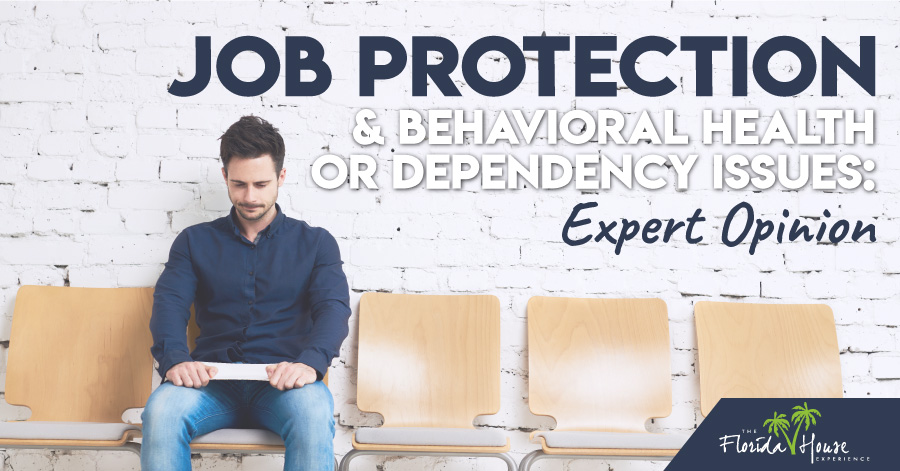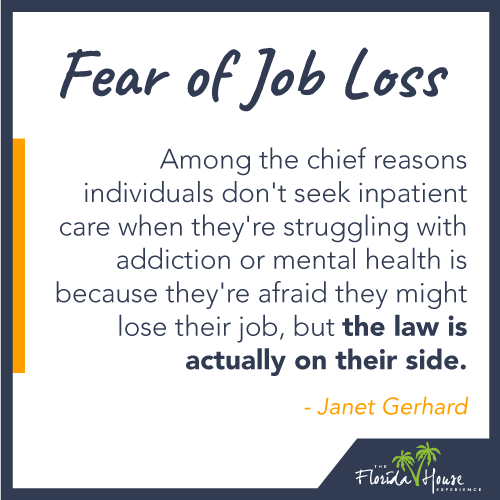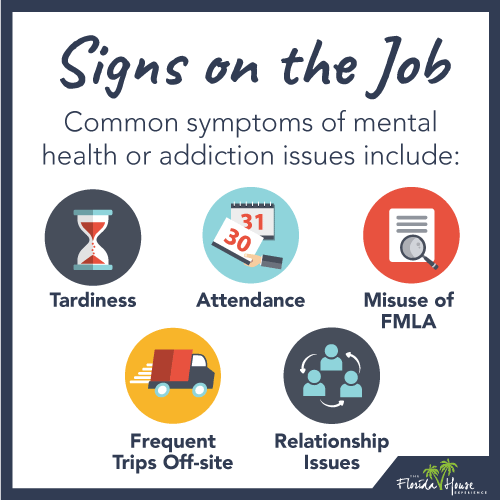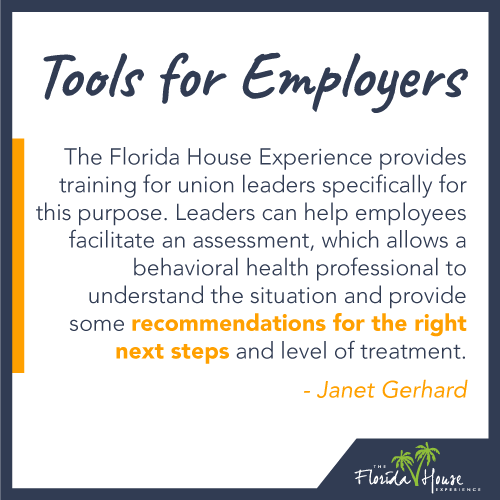
Understanding Job Protection and Behavioral Health or Dependency Issues
Among the chief reasons individuals don’t seek inpatient care when they’re struggling with addiction or mental health is because they’re afraid they might lose their jobs, says Janet Gerhard, the Director of Public and Community Affairs for FHE Health. But the law is actually on their side.
In her role with FHE Health, Gerhard works primarily with labor union leaders to help union presidents, shop stewards, and others protect the jobs of union employees who need treatment. She offered some advice on what signs might lead leadership or employers to realize there’s a problem and what options individuals have for seeking help.
Various Laws Protect Many Employees
 It’s not just union employees who are protected under American law, says Gerhard. “We use state and federal laws to hold jobs for 90 days or more” for individuals who require residential or intense outpatient treatment, she says.
It’s not just union employees who are protected under American law, says Gerhard. “We use state and federal laws to hold jobs for 90 days or more” for individuals who require residential or intense outpatient treatment, she says.
She points to the Americans with Disabilities Act (ADA) as an example of the types of laws that provide such protection. The ADA recognizes drug and alcohol addiction as a medical condition, which means missing work to seek treatment for those issues is protected under the Family Medical Leave Act. FMLA is a federal law that requires employers to hold positions for protected individuals who need to take time off work to seek treatment or assist an immediate family member who requires medical treatment. In short, FMLA means that a protected employee cannot be fired, even after taking a certain amount of leave, to deal with such issues.
Signs and Symptoms on the Job
 It’s important for both employees and employers to recognize when someone might be struggling with mental health or addiction issues. Gerhard points out that it’s union leadership’s job to watch for these signs so they can step in to assist a union worker in need and ensure a safe workplace.
It’s important for both employees and employers to recognize when someone might be struggling with mental health or addiction issues. Gerhard points out that it’s union leadership’s job to watch for these signs so they can step in to assist a union worker in need and ensure a safe workplace.
But this is true for employers, managers, and others. Many employers, even minus a union presence, offer Employee Assistance Programs and other resources because they realize that allowing a person to remain on the job while they are struggling with such issues isn’t good for anyone — including the employee in question, their coworkers and the company.
Whether you’re a union leader, an employer who wants the best for their staff or an employee who may be struggling with issues, here are a few signs Gerhard says it might be time to seek help from outside resources.
1. Increased tardiness
Individuals who are dealing with addiction or a behavioral health issue may not be able to remain on appropriate timelines. They may abuse drugs or alcohol at night or other times, causing them to ignore obligations, or they may stay out late and have trouble waking up and getting to work on time. In some cases, depression or anxiety can simply keep them in bed even though they know they’re supposed to be going to work.
2. Difficulty showing up for work
In even more extreme cases, individuals may skip work completely. They may call in sick more with increasingly poor excuses, or they may not bother calling in at all.
3. Misuse of FMLA
Individuals can qualify for two types of FMLA. The first type allows for an extended leave from work for a set amount of time. The second type is known as intermittent FMLA and protects individuals who may have to take off intermittently for health reasons (or for medical issues experienced by their spouse or children).
If someone lies or misrepresents their situation to obtain FMLA, using that time off to cover drug or alcohol abuse, that’s one example of misuse. They may also overuse their FMLA, taking 75 days off of work when they were only granted 60.
4. Frequent trips out to vehicles
Frequently leaving their work location to take a break in or visit their vehicle can be a sign that an employee is abusing drugs or alcohol. Employers and union leaders shouldn’t jump to conclusions because someone spends their 15-minute morning break reading in their car or likes to nap in their front seat during lunchtime. But if the trips are consistent throughout the day or don’t follow a pattern, such as spending time alone during lunch, they may indicate an issue.
5. Behaviors between employees
“Difficulty managing workplace relationships is a sign not necessarily of addiction but possibly of an underlying behavioral health issue,” says Gerhard. Again, not every relationship issue is a sign, but leaders may want to look for patterns.
Actions to Take
 Whether you’re struggling with addiction or behavioral health issues that are impacting your job or you see someone else in this situation, there are actions you can take. Union leaders can step in to help the worker deal with the problem, and employers can make it known that resources are available.
Whether you’re struggling with addiction or behavioral health issues that are impacting your job or you see someone else in this situation, there are actions you can take. Union leaders can step in to help the worker deal with the problem, and employers can make it known that resources are available.
Gerhard says FHE Health provides training for union leaders specifically for this purpose. Leaders can help employees facilitate an assessment, which allows a behavioral health professional to understand the situation and provide some recommendations for the right next steps and level of treatment.
While residential (or inpatient) treatment is often seen as the best option for those dealing with an addiction and for intense behavioral health issues, it’s not the only treatment option available. Here’s a look at some of the levels of treatment that might be the right choice for anyone dealing with issues in the workplace or any other area of their life.
- Therapy with a Licensed Clinical Social Worker (LCSW). Typically, you might see an LCSW for individual therapy once every week or two weeks for one hour. During this time, you undergo “talk therapy.” Gerhard says this is a common approach to issues such as stress, marital or relationship problems or anxiety. It may also be a step people take after completing inpatient and outpatient treatment for addiction.
- Intense outpatient treatment (or IOP). Gerhard says this usually involves living at home and traveling to a facility three to five times a week for a set number of hours for intense therapy in individual or group settings. The individual might also see a psychiatrist, who can prescribe and manage any medications.
- Residential treatment, which means living at a program for weeks or months as you seek sobriety or work on intense behavioral health conditions such as bipolar disorder, depression or severe anxiety. Individuals might step down from residential treatment by first going to IOP and then to individual therapy.
“One in four people nationally have an untreated behavioral health issue,” says Gerhard. Those issues can run the gamut from mild to severe, but it’s important for anyone who is struggling with addiction or mental health to be able to seek the treatment they need. And no one should avoid treatment simply because they are afraid for their job.






